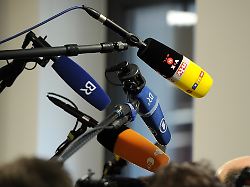Expulsions possible
Russian Foreign Ministry threatens German journalists
March 5, 2024, 9:25 p.m
Listen to article
This audio version was artificially generated. More info | Send feedback
Moscow is making claims that Russian journalists are being harassed in Germany. Berlin denies it: There are only restrictions on “information manipulation measures” that are subject to sanctions. Now Russia is talking about expelling German journalists.
Russian Foreign Ministry spokeswoman Maria Zakharova has threatened German correspondents with expulsion for allegedly harassing Russian media representatives in Germany. “I want to say this right away so that everyone knows it, and we already know this in Berlin through diplomatic channels: If someone touches the Russian correspondents and completes what they have thought up, then the German journalists will leave Russia,” said Zakharova in Moscow.
This was explained to the German ambassador Alexander Graf Lambsdorff the day before at the Foreign Ministry in Moscow, said Zakharova on the YouTube propaganda channel “Solovyov Live”. The spokeswoman called the conversation a demarche, i.e. an official diplomatic protest. It was about the discussions of German air force officers about the possible use of the Taurus cruise missile in Ukraine, which were intercepted by Russia. Lambsdorff said the appointment at the ministry had been planned for longer.
The Foreign Ministry’s statement on Monday spoke of alleged “ongoing attempts by the Federal Republic of Germany authorities to restrict the activities of Russian journalists in Germany.” It was made clear to the ambassador “that such actions do not go without a tough response.” Zakharova is not only the spokeswoman for the Russian Foreign Ministry. She also heads the department responsible for the accreditation, i.e. work permits, of foreign journalists.
Accusation over allegedly canceled meeting with Lavrov
The Foreign Office criticized the threats against the German correspondents in Moscow. Russia is not only becoming increasingly repressive at home; It is also trying to destabilize democratic societies abroad with propaganda and disinformation, said a spokesman in Berlin. “The threat against German correspondents in Russia who work there on the basis of their proper accreditation is just the latest example of this approach.”
Russian journalists can work freely and unhindered in Germany, the spokesman said. Decisions on issuing visas were made in accordance with law and order. However, he drew a line at the “continuous and concerted disinformation and information manipulation measures of the Russian state organs RT/Russia and Sputnik” and their representatives. The EU has already imposed sanctions on these state-owned Russian media in 2022 and banned their broadcasting activities in the EU.
In an interview with the state news agency Tass, Zakharova accused the ambassadors of the EU states of having canceled a meeting with Foreign Minister Sergei Lavrov at short notice. Lavrov allegedly wanted to warn diplomats against interfering in the Russian presidential election in mid-March. If ambassadors ignored appointments with the foreign minister, “then what are they still doing in our country?” Zakharova asked. There was initially no response to this request from the Foreign Office. The Foreign Office said the meeting was canceled after the death of Kremlin critic Alexei Navalny in Russian custody. The accusation of interference in the Russian elections is unfounded. The Russian leadership is responsible for the fact that there is no democratic choice between political alternatives in the country.
